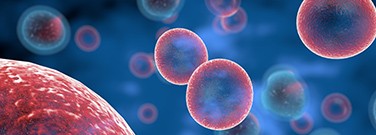“Natural Killer” Cells Are Your Body’s First Responders

By Kevin Ritchart
Despite their ominous name, the body’s NK or “Natural Killer” cells are a good thing.
NK cells are part of the body’s innate immune system. They serve as first responders when your body needs to fight infections and cancer, arriving at the scene and performing damage control until reinforcements arrive.
From birth, NK cells are designed to recognize danger and respond to it. Learning what fuels NK cells to do this important job is an active area of immunology research, and the things scientists learn about these cells have important clinical applications.
“There's a lot of interest right now in NK cells as a potential target of immunotherapy,” said Joseph Sun, an immunologist in the Sloan Kettering Institute. “The more we can understand what drives these cells, the better we can program them to fight disease.”
Cell Power
Previous work done by Sloan Kettering researchers has found that T cells rely on a metabolic process called aerobic glycolysis to carry out their protective functions. If NK cells are the body’s first responders, T cells are the emergency room doctors. Whether NK cells use aerobic glycolysis to do their jobs was unknown at first.
Because Dr. Sun and his colleagues studied NK cells in animals instead of a dish, they were able to establish what type of metabolism NK cells use and compare it to T cells in a natural setting.
Saving Strength
Researchers found that NK cells ramp up aerobic glycolysis about five days before the T cells respond with their own glycolytic surge. The trick for scientists is finding a balance between encouraging NK cells to multiply and preserving their stamina.
Pushing the cells to multiply too rapidly could have a negative effect on their responsiveness once they’re put into a patient.
These findings by the Sloan Kettering team, which were published on June 1 in the journal Cell Reports, are relevant to ongoing efforts to use NK cells as immunotherapy in patients with cancer and other medical conditions. Specifically, NK cells have potential as a form of cell therapy, the process of growing cells outside of a patient and later infusing those cells back into a patient’s bloodstream.
Researchers are hopeful that further work with NK cells will yield additional findings that aid in the fight against cancer and other diseases.
Discussion Questions
- What are some ways you can tell that the cells inside your body are fighting a cold or other type of physical ailment?
- Aside from NK and T cells, do you know of any other types of cells whose primary function is to fight disease?
Vocabulary
- Ominous
- Immunology
- Metabolic
- Aerobic glycolysis